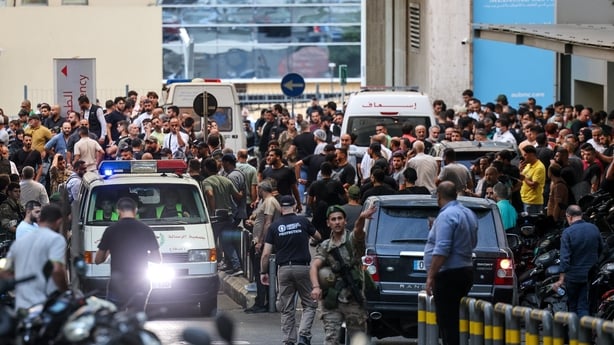At least 14 people were killed and 15 others injured in an Israeli airstrike on the northern Lebanese town of Ain Yaaqoub, according to the town's mayor.
The strike, which marks the northernmost point in Lebanon hit by Israeli forces since hostilities began in October 2023, hit a building where 30 people were residing, including Syrian refugees.
The local mayor said some people were still trapped under the rubble.
Earlier today, an Israeli raid in the southern town of Saksakiyeh killed at least seven and injured seven more, according to the Lebanese health ministry.
The ministry said Israeli attacks on Lebanon have killed 3,243 people and injured 14,134 since 7 October 2023.
It comes as Israel's new foreign minister has said there had been progress toward a ceasefire in Lebanon, where war has raged for more than six weeks as Israel targets Hezbollah.
"There is certain progress," Gideon Saar said in response to a question about a possible ceasefire. "We are working with the Americans on the issue," he told reporters in Jerusalem.
Israel escalated air strikes in late September targeting Hezbollah across Lebanon and sent in ground troops on 30 September.
Israeli Prime Minister Benjamin Netanyahu has said the aim of the operation is to push Hezbollah north of the Litani river, which flows across southern Lebanon.
Another goal is to stop any attempt by Hezbollah to rearm.
The group is armed and financed by Iran.
Mr Saar reiterated Israel's objectives. He said Israel would "be ready" for a ceasefire if Hezbollah is not on the country's border and unable to rearm itself with weapon systems arriving "from Syria, from the sea, from the airport".
He added: "The main challenge, eventually, will be to enforce what will be agreed."
"We want to get our citizens back home safely, and if we will meet the right conditions, we will be there. In the meantime, the operation of the IDF (Israel Defense Forces) near our border continues," Mr Saar added.
Tens of thousands of Israelis were displaced when Hezbollah began cross-border fire more than a year ago in what it described as support for Palestinian militants Hamas, who attacked Israel triggering the ongoing war in Gaza.
Meanwhile, a spokesperson for Mr Netanyahu said the Prime Minister had approved the pager attacks against Hezbollah in September.
On 17 September, thousands of pagers simultaneously exploded in the southern suburbs of Beirut and other Hezbollah strongholds, in most cases after the devices beeped, indicating an incoming message.
The Israeli military had at first declined to respond to questions about the detonations.

A Hezbollah official had said that the incident was the "biggest security breach" for the group in nearly a year of conflict with Israel.
In total, the pager attack, and a second on the following day that activated weaponised walkie-talkies, killed 39 people and wounded more than 3,400.
Israeli media reported yesterday that Mr Netanyahu said during a cabinet meeting that he approved the attack, telling ministers that senior defence officials and political figures were opposed to the detonation of the pagers, but that he went ahead with the operation.
Hezbollah fighters have been using pagers as a low-tech means of communication in an attempt to evade Israeli location-tracking, two sources familiar with the group's operations told Reuters this year.
Israel followed up the pager detonations with the killing of Hezbollah leader Hassan Nasrallah in an air strike.

